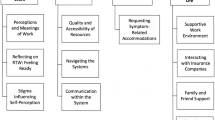Abstract
Purpose
Work is an important quality of life indicator for many cancer survivors. There is, however, a lack of appropriate support to help survivors with work integration. As a result, many survivors are forced to independently navigate their return to work, experiencing unnecessary pitfalls in the process. As a preliminary step toward addressing this current gap in survivorship support, we explored the work integration experiences of 20 cancer survivors, 10 women and 10 men.
Methods
Photovoice methods were combined with two individual interviews per participant. Participant-produced photographs and interview transcripts were analyzed to identify key themes.
Results
Both commonalities and gender-differentiated motivations underlying work integration emerged. Female and male participants both demonstrated and discussed differentiated manners of coping. Men expressed a propensity for productivity and active engagements over talking used predominantly by women.
Conclusion
Appreciation of men’s proclivity for productivity and activity suggests that a gender-tailored approach to rehabilitation may enhance male survivors’ participation and the utility of rehabilitation efforts.




Similar content being viewed by others
References
Bradley CJ, Bednarek HL (2002) Employment patterns of long-term cancer survivors. Psychooncology 11(3):188–198. doi:10.1002/pon.544
Spelten ER, Sprangers MAG, Verbeek JHAM (2002) Factors reported to influence the return to work of cancer survivors: a literature review. Psychooncology 11(2):124–131. doi:10.1002/pon.585
Amir Z, Moran T, Walsh L, Iddenden R, Luker K (2007) Return to paid work after cancer: a British experience. J Cancer Survivorship 1(2):129–136. doi:10.1007/s11764-007-0021-2
Mehnert A (2011) Employment and work-related issues in cancer survivors. Crit Rev Oncol Hematol 77:109–130. doi:10.1016/j.critrevonc.2010.01.004
Neary D (2011) Epidemiology. In: Feuerstein M (ed) Work and cancer survivors. Springer, New York, pp 3–23
Verbeek J, Spelten E, Kammeijer M, Sprangers M (2003) Return to work of cancer survivors: a prospective cohort study into the quality of rehabilitation by occupational physicians. Occup Environ Med 60(5):352–357. doi:10.1136/oem.60.5.352
Chan F, Strauser D, Cardoso ES, Xi ZL, Chan JYC, Feuerstein M (2008) State vocational services and employment in cancer survivors. J Cancer Survivorship 2(3):169–178. doi:10.1007/s11764-008-0057-y
Poirier P (2005) Policy implications of the relationship of sick leave benefits, individual characteristics, and fatigue to employment during radiation therapy for cancer. Policy Polit Nurs Pract 6(4):305–318. doi:10.1177/1527154405283411
Spelten ER, Verbeek JH, Uitterhoeve AL, Ansink AC, van der Lelie J, de Reijke TM, Kammeijer M, de Haed JCJM, Sprangers MAG (2003) Cancer, fatigue and the return of patients to work: a prospective cohort study. Eur J Cancer 39(11):1562–1567. doi:10.1016/S0959-8049(03)00364-2
Ahn E, Cho J, Shin DW, Park BW, Ahn SH, Noh D-Y, Nam SJ, Lee ES, Yun YH (2009) Impact of breast cancer diagnosis and treatment on work-related life and factors affecting them. Breast Cancer Res Treat 116(3):609–616. doi:10.1007/s10549-008-0209-9
Taskila T, Lindbohm ML, Martikainen R, Lehto US, Hakanen J, Hietanen P (2006) Cancer survivors’ received and needed social support from their work place and the occupational health services. Support Cancer Care 14:427–435. doi:10.1007/s00520-005-0005-6
Canadian Partnership Against Cancer (2012) Programs and resources to facilitate return to work for people with cancer or other chronic diseases: environmental scan. http://www.cancerview.ca/idc/groups/public/documents/webcontent/rtw_environmental_scan.pdf Accessed 25 July 2014
Morrison T, Thomas RL (2014) Survivors’ experiences of return to work following cancer: a photovoice study. Can J Occup Ther 81:163–172. doi:10.1177/0008417414534398
Nitkin P, Parkinson M, Schultz IZ (2011) Cancer and work: a Canadian perspective. Canadian Association of Psychosocial Oncology. www.capo.com. Accessed 28 July 2014
Wells M, Williams B, Firnigl D, Lang H, Coyle J, Kroll T, MacGillivray S (2013) Supporting ‘work-related goals’ rather than ‘return to work’ after cancer? A systematic review and meta-synthesis of 25 qualitative studies. Psychooncology 22:1208–1219. doi:10.1002/pon.3148
Wang CC (1999) Photovoice: a participatory action research strategy applied to women’s health. J Womens Health 8:185–192. doi:10.1089/jwh.1999.8.185
Wang C, Burris M, Ping XY (1996) Chinese village women as visual anthropologists: a participatory approach to reaching policymakers. Soc Sci Med 42:1391–1400. doi:10.1016/0277-9536(95)00287-1
Pink S (2007) Doing visual ethnography, 2nd edn. Sage, Thousand Oaks
Mueller C (2006) Creating a joint partnership: including Qallunaat teacher voices within Nanavik education policy. Int J Incl Educ 10:429–447. doi:10.1080/13603110600578281
Hergenrather KC, Rhodes SD, Cowan CA, Bardhoshi G, Pula S (2009) Photovoice as community-based participatory research: a qualitative review. Am J of Health Behav 33(6):686–698
Shenton AK (2004) Strategies for ensuring trustworthiness in qualitative research projects. Educ Inf 22:63–75
Affleck M, Glass KC, Macdonald ME (2012) The limitations of language: male participants, stoicism, and the qualitative research interview. Am J Mens Health 7(2):155–162. doi:10.1177/1557988312464038
Luker K, Campbell M, Amir Z, Davies L (2013) A UK survey of the impact of cancer on employment. Occup Med 63:494–500. doi:10.1093/occmed/kqt104
Handberg C, Nielsen CV, Lomborg K (2014) Men’s reflections on participating in cancer rehabilitation: a systematic review of qualitative studies 2000–2013. Eur J Cancer Care 23(2):159–172. doi:10.1111/ecc.12131
Rasmussen DM, Elverdam B (2008) The meaning of work and working life after cancer: an interview study. Psychooncology 17(12):1232–1238. doi:10.1002/pon.1354
Amir Z, Neary D, Luker K (2008) Cancer survivors’ views of work 3 years post diagnosis: a UK perspective. Eur J Oncol Nurs 12(3):190–197. doi:10.1016/j.ejon.2008.01.006
Lilliehorn S, Hamberg K, Kero A, Salander P (2013) Meaning of work and the returning process after breast cancer: a longitudinal study of 56 women. Scand J Caring Sci 27:267–274. doi:10.1111/j.1471-6712.2012.01026.x
Moyhihan C (2002) Men, women, gender, and cancer. Eur J Cancer Care 11(3):166–172
Wenger LM (2013) ‘Living under assault’: men making sense of cancer. Eur J Cancer Care 22(3):389–399. doi:10.1111/ecc.12042
Holm LV, Hansen DG, Johansen C, Vedsted P, Larsen PV, Kragstrup J, Søndergaard J (2012) Participation in cancer rehabilitation and unmet needs: a population-based cohort study. Support Care Cancer 20:2913–2924. doi:10.1007/s00520-012-1420-0
Conflict of interest
None.
Funding
This research was supported by the Canadian Institutes of Health Research Strategic Training in Health Research Postdoctoral Strategic Training Fellowship (Transdisciplinary Understanding and Training on Research-Primary Health Care) as well as the Canada Research Chairs Program.
Author information
Authors and Affiliations
Corresponding author
Rights and permissions
About this article
Cite this article
Morrison, T.L., Thomas, R.L. Comparing men’s and women’s experiences of work after cancer: a photovoice study. Support Care Cancer 23, 3015–3023 (2015). https://doi.org/10.1007/s00520-015-2670-4
Received:
Accepted:
Published:
Issue Date:
DOI: https://doi.org/10.1007/s00520-015-2670-4




